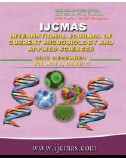


 National Academy of Agricultural Sciences (NAAS)
National Academy of Agricultural Sciences (NAAS)

|
PRINT ISSN : 2319-7692
Online ISSN : 2319-7706 Issues : 12 per year Publisher : Excellent Publishers Email : editorijcmas@gmail.com / submit@ijcmas.com Editor-in-chief: Dr.M.Prakash Index Copernicus ICV 2018: 95.39 NAAS RATING 2020: 5.38 |
Ruminant livestock constitute worldwide the most important source of anthropogenic emissions of methane. There are two main factors influencing global warming change, an increase in greenhouse gas emissions and depletion of the ozone layer. Methane is associated with both factors. Ruminants (dairy, beef, goats, and sheep) are the main contributors to CH4 production. Their CH4 production is a natural and inevitable outcome of rumen fermentation. To overcome this situation, the most promising way to mitigate enteric methane production is either through dietary manipulation by supplementing diet with herbal feed additives containing tannins as an active principal. Tannins are polyphenolic secondary plant compounds that they do not actively involved in primary biochemical processes such as plant growth, development and reproduction but have been shown to affect microbial activity to impact fermentation, protein degradation and methane production. There is a need for identifying feed additives with the potential to modify rumen fermentation for enhancing the efficiency of utilization of feed energy while decreasing rumen methanogenesis. However amount of tannins to be provided so as to increase nutrient digestibility needs further investigation as there is very fine line between positive and negative effects of tannins.
 |
 |
 |
 |
 |